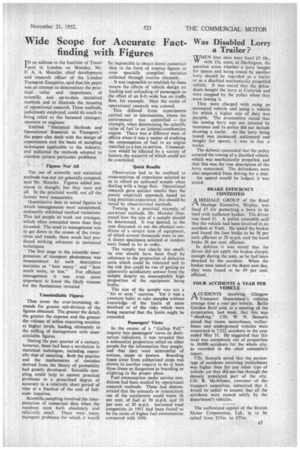Was Disabled Lorry a Trailer ?
Page 37

If you've noticed an error in this article please click here to report it so we can fix it.
WHEN four men were fined £5 10s., with 15s. costs, at Darlington, the question arose whether a lorry bought for spares and being towed by another lorry should be regarded as a trailer or as a disabled mechanicaliy propelled vehicle. It was stated that the defendants bought the lorry at Catterick and were stopped by the police when they were towing it.
They were charged with using an uninsured vehicle and using a vehicle for which a higher rate of duty was payable. The prosecution stated that the towing lorry was not covered by insurance and its policy did not include drawing a trailer. As the lorry being towed was uninsured, unlicensed and bought for spares, it was in fact a trailer.
The defence contended that the policy covered the towing of a disabled vehicle, which was mechanically propelled, and that this was the true description of the lorry concerned. The defendants were also suspended from driving for a year.
An appeal would be lodged, it was stated.
BRAKE EFFICIENCY CONTESTED
A 1REDALE GROUP of the Road fl Haulage Executive, Shipley, was fined £5 for permitting a lorry to be used with inefficient brakes. The driver was fined £1. A police constable said that the vehicle had been involved in an accident at York. He tested the brakes and found the foot brake to be 36 per cent. efficient at 20 m.p.h. and the hand brake 26 per cent. efficient.
In defence it was stated that the driver did not apply the brakes sharply enough during the tests, as he had been shocked by the accident. When the brakes were tested at the depot next day, they were found to be 49 per cent. efficient.
FOUR ACCIDENTS A YEAR PER VEHICLE
A CCIDENTS involving 'Glasgow tA Transport Department's vehicles average four a year per vehicle. Bailie Gordon Reid said, at a meeting of the corporation, last week, that thiswas "shocking." Cllr. W. N. Samuels stated that trams, motorbuses, trolleybuses and underground vehicles were concerned in 7,522 accidents in the year ended May 31. He suggested that this total was completely out of proportion to 10,000 accidents for the whole city, as recorded in the chief constable's report.
Cllr. Samuels noted that the percentage of accidents involving trolleybuses was higher than for any other type of vehicle, yet they did not run through the densely populated part of the city. Cllr. R. McAllister, convener of the transport committee, submitted that it would be unfair to assume that all the accidents were caused solely by the department's vehicles.
The authorized capital of the British Motor Corporation,. Ltd., is to be raised from t 15m. to £35m.




















































































